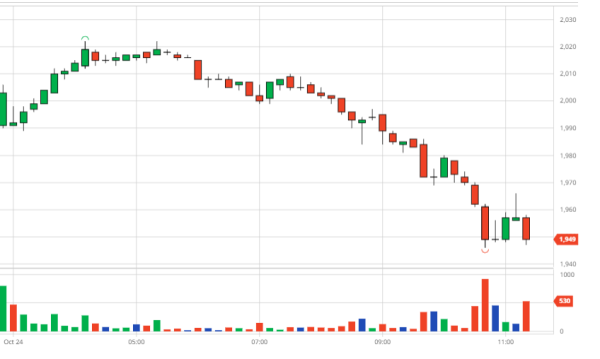The new British Prime Minister announced that he will temporarily maintain the current policy, not in a hurry to change, while commodity speculators are still worried that the Fed will be strong at the upcoming policy meeting…

Robusta chart London T1/2023 session on October 24, 2022
At the end of the first session of the week, the price of Robusta coffee on ICE Europe – London continued to decline. Futures for delivery in January decreased by 43 USD to 1,953 USD/ton and term for delivery in March decreased by 41 USD to 1,939 USD/ton, sharp declines. Trading volume remains very high above average.
Similarly, the price of Arabica coffee on the ICE US floor – New York has a downward trend. December spot futures fell another 0.50 cents to 190.40 cents/lb and March 2023 futures fell another 0.85 cents to 184.95 cents/lb, slight declines. Trading volume remained very above average .
The price of green coffee beans in the Central Highlands provinces decreased by 800-900 VND, to range from 42,700 to 43,200 VND/kg.
USDX’s return to bullish momentum with President Xi Jinping in power for another 5 years makes the market worried that the world’s largest consumer of goods continues to reinforce the “not market-friendly” zero-covid policy, People The currency fell to its lowest level since 2008.
Coffee prices maintained a downtrend as commodity funds and investors continued to liquidate their net positions in the face of increasing monetary interest rate pressure and the possibility that the world economic recession would last until the end of 2023.
The pressure on the London Robusta floor increased when Vietnam officially entered the harvest of the new crop of coffee crop 2022/2023 with an estimated output of more than 30 million bags, which will be put on the market in about 5-7 days. another week.
The price of Robusta coffee returned to a downtrend after investors ended the options contract and returned to net selling with a fairly high volume, while the Reais dong plummeted by 2.97%, the exchange rate fell to 1. USD = 5,3010 R$ has supported Brazilians to increase sales of new crop coffee. A report last week by Safras & Mercados estimated that Brazil has sold about 60 percent of its freshly harvested crop so far, up from 52 percent last year.
English (giacaphe.com)
